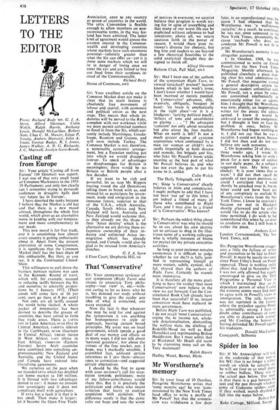LETTERS TO THE EDITOR
From: Richard Body MP, G. J. A. Stern, Alfred Sherman, Colin Welch, Ralph Harris, Anthony Lewis, Donald McLachlan, Robert Not:, Chas C. M. Mower, Edgar P. Young, Andrew Hunwick, John A. Yeats, George Buday, R. I. Jones, Jaynes Walker, A. N. G. Richards,
I. C. Maxwell, Josslyn Gore-Booth.
Casting off from Europe
Sir: Your article 'Casting off from Europe' (10 October) was superb. 1 was one of that very small band of Common Marketeers in the 1955- 59 Parliament; and only too clearly can 1 remember trying to persuade audiences in draughty halls that 'our future lay in Europe'.
I have deserted the ranks because
I believe that the Market is old hat and that there is a new mood abroad, throughout the whole free world, which gives us an alternative move in keeping with our tempera- ment and more complementary to our needs.
This new mood is for free trade, and it is astonishing how almost every country is getting enthusiastic about it. Apart from the present aberration of some Congressmen, it is significant that the Common Market itself has the least share of this enthusiafm. But then, as you say, it is the Continental Closed- Shop.
This willingness to pull down the harriers between nations was seen in the Kennedy Round of GArr, which will, for example, succeed in reducing tariffs between the Six and ourselves to tolerable propor- tions by 1 January 1972. (Their goods will come here at 10 per cent; ours go there at 8 per cent.)
Not only are all tariffs around the world being slashed. A whole packet of mnemonics has been devised to describe the groups of countries that have united to form free trade areas. There is LAFTA (six in Latin America), OCAS (five in Central America), CARIFTA (eleven in the Caribbean), OCAM (fourteen in Central Africa), UDEAO (seven in West Africa), EAEC (three in East Africa), COMECON (Eastern Europe). Seven Arab countries have combined into something un- pronounceable; New Zealand and Australia. and the United States and Canada have entered into liberalising agreements.
We ourselves set the pace when we founded EFTA which has doubled our home market to 100 million. It is blessed with two advantages denied to EEC: it makes no inroads into sovereignty and it does not complicate itself with agriculture.
If EFTA has a fault it is that it is too small. Then make it larger: let it become the Open Free Trade Association, open to any country or group of countries in the world. The EFTA Convention is flexible enough to allow members on non- reciprocable terms, in the way Ice- land has been admitted. The latter kind of agreement would arouse the greatest interest in the Common- wealth and developing countries whose markets have such enormous potential—infinitely greater than what the Six can offer us—yet it is those same markets which we will be in danger of losing once we enter the EEC and are forced to buy our food from their surpluses in- stead of the Commonwealth, Richard Body House of Commons, swl
Sir: Your excellent article on the Common Market does not make it clear that its main feature is absolutely free movement of labour and capital, with economic and political union as the next steps. This means that whole in- dustries will be moved to the Ruhr, complete with our workmen while we must permit unlimited numbers to flood in from the Six, which cur- rently include Martinique, Guada- loupe, Reunion and Guiana, and will soon include Turkey. The Common Market is not, therefore, a terminable economic arrange- ment, but a Eurasian melting pot into which we would disappear forever. To speak of advantages or disadvantages for Britain is meaningless; there would be no Britain or British people after a few decades.
If we want to be rich and powerful, let us stop Mr Rippon touring round the old Dominions telling them to break with us, and instead let us participate by invest- ment, trade and emigration in the immense future, superior to that • of the U.S.A., which Australia, Canada, South Africa and New Zealand will have. Australia and New Zealand would welcome this, as they already see the shape of their 'Asian destiny' which is the alternative we are driving them to: Japanese ownership of their in- dustry and unlimited Asian im- migration which has already started, and Canada would also be glad to be rescued from America's clutches.
G.1. A. Stern 6 Eton Court, Shepherds Hill, N6






































 Previous page
Previous page